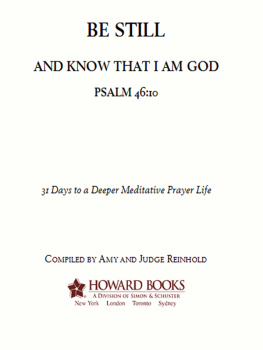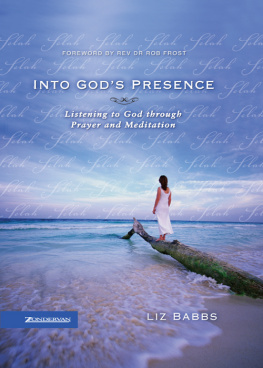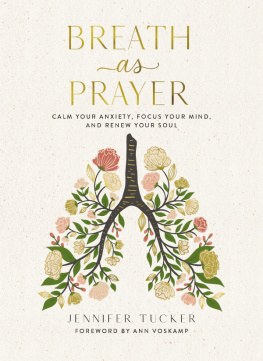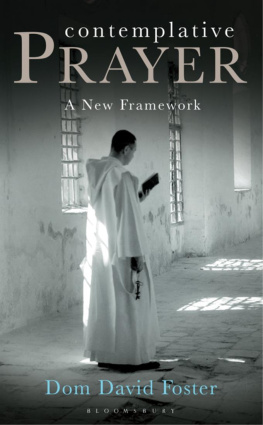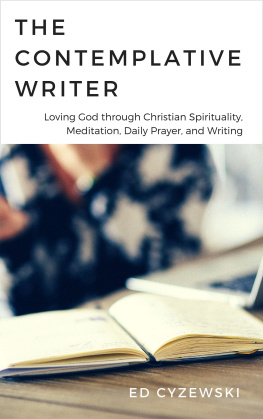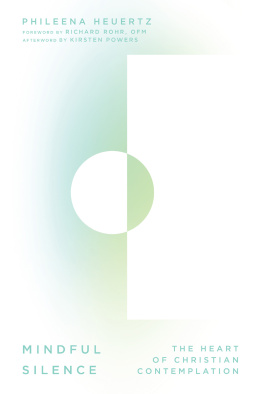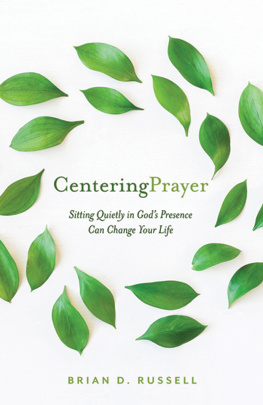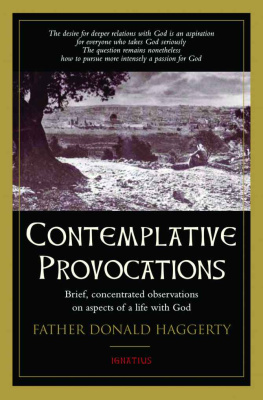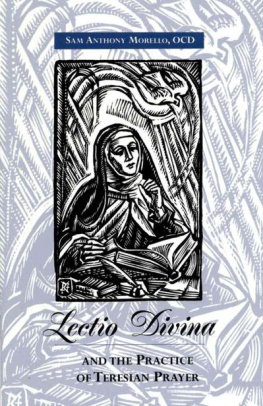Our purpose at Howard Books is to:
Increase faith in the hearts of growing Christians
Inspire holiness in the lives of believers
Instill hope in the hearts of struggling people everywhere Because Hes coming again!
 | Published by Howard Books, a division of Simon & Schuster, Inc.
1230 Avenue of the Americas, New York, NY 10020
www.howardpublishing.com |
Be Still 2007 by Amy and Judge Reinhold
All rights reserved, including the right to reproduce this book or portions thereof in any form whatsoever. For information, address Howard Subsidiary Rights Department, Simon & Schuster, 1230 Avenue of the Americas, New York, NY 10020.
Library of Congress Cataloging-in-Publication Data
Reinhold, Amy, date.
Be still: 31 days to a deeper meditative prayer life / Amy and Judge Reinhold.
p. cm.
Summary: Thirty-one daily meditations, introducing readers to a form of contemplative prayer called Lectio Divina, in which Scripture is read aloud slowly and deliberatelyProvided by publisher. Includes bibliographical references.
1. Spiritual lifeChristianityPrayers and devotions. 2. Devotional calendars. I. Reinhold, Judge, date. II. Title.
BV4810. R45 2007
248.4dc22 2007023314
ISBN-13: 978-1-4165-7732-4
ISBN-10: 1-4165-7732-7
HOWARD and colophon are registered trademarks of Simon & Schuster, Inc.
Visit us on the World Wide Web:
http://www.SimonSays.com
Edited by Philis Boultinghouse
Illustrations by Lezle Williams
Authors photo by Jay Raymond, Onfire Images
P ERMISSION N OTICES
Acknowledgments
We are deeply grateful for the generosity, support, prayers, and friendship of all of our wonderful contributors: Dr. Henry Cloud, Michelle McKinney Hammond, Bill Dallas, Richard Foster, Dr. Mark Brewer, Dallas Willard, Jan Johnson, Dr. Jerry Root, Tim Lundy, Lon Allison, Philip Yancey, Dr. Calvin Miller, Max Lucado, Steve Green, Karen Hill, Philis and Denny Boultinghouse, Lezle Williams, as well as the great cloud of witnesses who have faithfully walked the narrow path before us.
I NTRODUCTION
Reclaiming the Art of Christian Meditation
D R. H ENRY C LOUD
As a psychologist whos worked with many people over the years, I have watched the way people grow and change, and I have seen a difference between those who have a rich prayer life and those who dont. So I was excited when Amy and Judge started talking to me about this project, because I have discovered how contemplative prayer has affected not only me personally, but others as well.
I TS A LL ABOUT G OD
What is your first association when you see the word meditation? Is it some sort of New Age thing? Christians have actually learned to be afraid of this word and anything that feels meditative or contemplative because they think it is New Age. However, if you look at the Bible and the traditions in the church, youll find that the practice of contemplation and meditation on Scripture is deeply biblical.
But somehow, starting in the 1960s, Christians started thinking that only Eastern religions meditate. We started thinking that the only acceptable Christian practices were Scripture memorization, learning doctrine, and sharing prayer requests. Sometimes I think we took those ideas to the extreme and made the spiritual life all about just the Bible. Yet, in the Bible Jesus says to the Pharisees, You search the Scriptures, thinking in them they have eternal life, but they point to Me.
Dont get me wrong. I love the Bible. I write about the Bible. The Bible is Gods Word. But its not the end of things. The Bible points us to a real, alive God whom we are supposed to be meeting with, praying to, and developing an intimate relationship with.
I am so excited about everyone who came together for both the Be Still DVD and this book. Men and women like Max Lucado, Richard Foster, Philip Yancey, Dr. Jerry Root, Dallas Willard, Michelle McKinney Hammond, and Calvin Miller have contributed to show that the practice of meditation on Scripture with God and before God is deeply biblical. Christians are finally reclaiming the ground Eastern religions took over in the 1960s.
C HRISTIAN M EDITATION VERSUS N EW A GE M EDITATION
Why did people flock to the New Age meditative experiences of the 60s? Partly because of the physiological health benefits. These benefits were created by God Himself for you to experience in the process of being still. Research has found that when people enjoy the simple practice of getting out of the noise to focus and be still, very practical, physiological things happen. Their blood pressure changes, their brain waves change, their immune system is affected, their head clearsall sorts of good things happen because God designed us to respond this way.
The major difference between New Age meditation and Christian meditation is that you werent designed to meditate merely as a practice; you were designed to meditate with a person. In Christian contemplative prayer you are being still in relationship with the person of God. Your focus is on God and His Word. Imagine combining those practical physiological effects with the life-changing spiritual effects of being still with God through His Word!
B EGIN BY D EALING WITH W HATS N OT W ORKING
Now its time to get real. This is easier said than done. Life is not going to stop for prayer; you have to stop life for prayer. And youre the only one in control of that. But too many times, our efforts to do it right end up all wrong.
D ONT B E D ERAILED BY F AILURE
All of us understand the intent of prayer and at times become motivated to have a better prayer life. Unfortunately, most good intentions are like New Years resolutions, which are gone by the end of January.
Simple universal realities show us how intentions fail to become reality when we attempt to master ourselves through our own efforts of self-discipline. Heres what happens:
You start off with the desire to do better: You say to yourself: I want to pray more; I want a better relationship with God. I want to You make a commitment. Tomorrow maybe you follow through, but the next day you dont, and then it turns into I ought to pray.
Then you enter the valley of guilt: Once you start saying you ought to and youre not doing it, you have entered the valley of the shadow of guilt. What do you do when you begin to feel guilty about not praying? You move to the next level of ineffectiveness: you resist.
You resist the standard: When theres a standard and you dont live up to it, you feel worse, and you actually resist that standard. In the Bible, the law is a standard were supposed to live up to, and when we dont, we feel bad.
Finally, we feel bad about the person we were originally attracted to: As things worsen, we actually start to feel bad about the person were supposed to spend time with. What are we supposed to do? Try harder? Willpower has already failed. So whats next?
C ONDUCT A P RAYER A UDIT
How many of you, if you watched the video of your prayer life, would confess that you sometimes dont or havent prayed enough or prayed right? Does anyone pray perfectly? If you think you do, you should take a look in the mirror, because you need to see what a person in denial looks like.
You can begin to get a handle on your prayer life by keeping a prayer log. First, take a look at the last week, the last month, the last six months, and the last year of your prayer life. Just write it down and look at it, but dont feel bad or guilty about it. Now think about the reality of how youll likely spend time connecting with God in the future. Then play the movie for the next year, the next two years, and the next five years. Youll see what your spiritual life and connection with God will look like five years from now if there is no change and the only thing youve got going for you is willpower.

